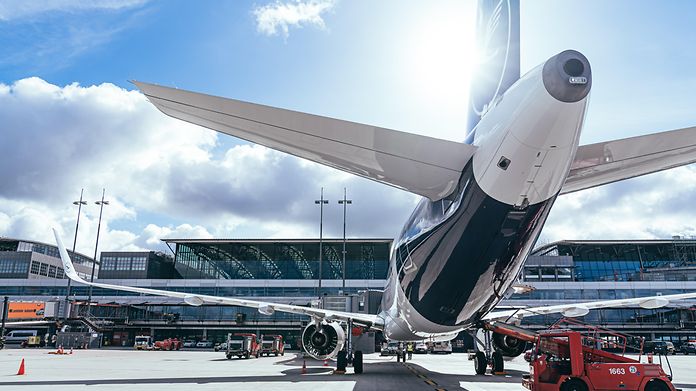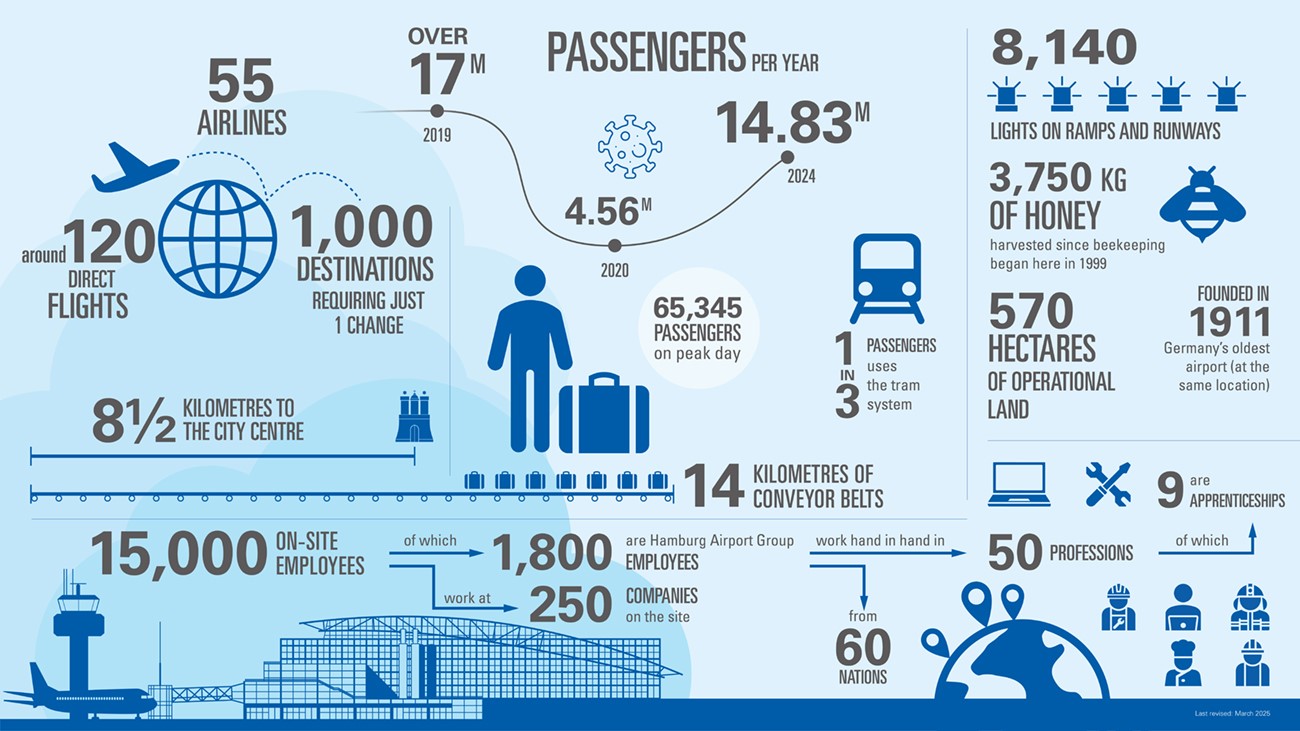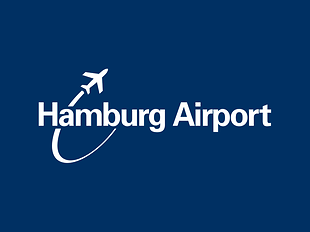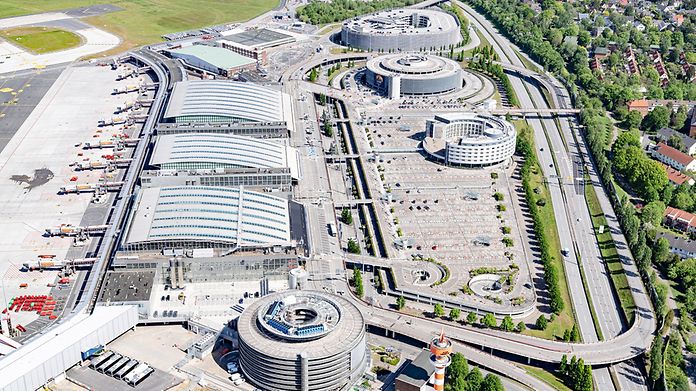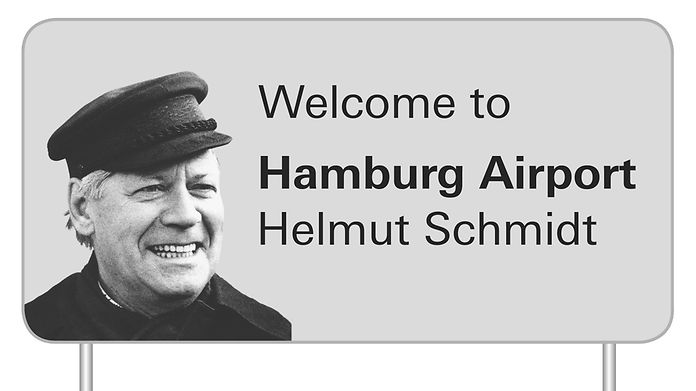Hamburg Airport in figures
Other important facts
Passenger figures
- Air traffic continued to recover from coronavirus in 2024: Hamburg Airport recorded approximately 14.83 million arriving and departing passengers - around 9 percent more than in the previous year.
- Hamburg Airport during the corona pandemic: In 2021, around 5.32 million passengers traveled from Hamburg Airport, 69 percent less than in 2019 but 17 percent more than in the first year of corona (4.56 million passengers),
- making it the largest airport in northern Germany - in 5th place nationwide.
Air cargo
- The Hamburg Airport Cargo Center (HACC), which is directly connected to the apron with its own border control point, opened in 2016
- The HACC can handle around 150,000 tons of air freight per year
- In 2024, around 65,400 tons of freight were handled via the HACC, which is around 39 percent more than in the previous year (2023: 47,200 tons)
Airlines
- Around 55 airlines connect Hamburg Airport with around 120 national and international direct destinations - making Hamburg Airport the leader in northern Germany
- Over 1,000 destinations worldwide can be reached with just one transfer.
Premises
Flight operations commenced in 1911 on a 44-hectare site.
Today, the premises have grown to 570 hectares, incorporating the largest contiguous green space in Hamburg.
The site is surrounded by a 22-kilometer perimeter fence and an 18-kilometer perimeter road.
Apron
A comprehensive refurbishment of the 330,000-square-meter main apron (Apron 1) was undertaken from 2016 to 2020.
A total of 55 aeroplanes can now be handled at any one time.
To handle aircraft, there are 19 pier positions (15 with jetbridges and 4 walk-in-walk-out positions) as well as additional remote positions on Apron 1. A further 14 remote positions on Apron 2 are available for charter and scheduled traffic.
Runways
Hamburg Airport has two intersecting runways.
Taking off and landing is possible in four directions.
General Aviation Terminal
A separate terminal with comprehensive infrastructure is available for general aviation.
On average, 35 private jets, propeller aircraft, and helicopters park in the adjacent hangar.
There are around 55 take-offs and landings per day (mostly commercial: charter flights, private flights, and training flights).
Shops, food & beverage, counters
| TERMINAL 1 | TERMINAL 2 | Plaza + Pier | Total | |
| Number of check-in counters | 50 | 40 | - | 90 |
| Number of shops and restaurants | 9 | 6 | 39 | 54 |
| Number of travel agency counters | 10 | - | - | 10 |
Employees
Hamburg Airport Group: around 1,800
Subsidiary companies: around 1,010
Flughafen Hamburg GmbH: around 790
Value generation in the region*
- A total of 15,000 people are employed at Hamburg Airport, 2000 of them directly with Flughafen Hamburg GmbH and its subsidiaries.
- Each of the 15,000 jobs at Hamburg Airport secures a further 1.8 jobs in Hamburg.
- The purchasing power of domestic and international guests drive positive local demand effects amounting to 1.3 billion euros.
- Every euro of value creation at the airport also generates 2.0 euros of value creation in Hamburg – totalling at least 500 million euros per year.
*Source: Institute of International Economics (HWWI), report from 2017
Revenue
- 2018: 269.4 million euros
- 2019: 274.8 million euros
- 2020: 119.6 million euros
- 2021: 128.9 million euros
- 2022: 216.7 million euros
- 2023: 259.4 million euros
- 2024: 284.6 million euros
Annual reports
Executive Board
Hamburg Airport’s business divisions
The most important task of the Aviation Division is to ensure smooth airport operations, working in close collaboration with the airlines. Aviation is responsible for continuous optimation of passenger flow, airport logistics, and the strategic evolution of cargo. Furthermore, Aviation assigns aircraft positions on the apron and the check-in counters in the terminals. Responsibility for “safety and security” also brings the Airport Fire Brigade and the Security services within the scope of Aviation.
Hamburg Airport’s focus on the needs of passengers is the remit of the Passenger Management Division. From home to the plane and back — one core business division is responsible for every point of contact with the passenger and every interaction that shapes the customer experience. This includes passenger information, passenger services, guidance and orientation at the airport, terminal management, baggage logistics, hygiene, and cleaning.
The management of all rental units, management and marketing of the advertising business, and all retail and food & beverage activities are included in the remit of the Center Management (FC) Division. Responsibilities also include location marketing, guiding the joint marketing programme, awarding concessions for landside traffic, and the concept and rental of the new Air Cargo Center.
Real Estate Management is responsible for developing the airport property in line with demand and operating it safely. In addition to assuming operator responsibility, Real Estate Management is also responsible for project development and the planning and implementation of construction projects.
Various overlapping processes make up the Ground Handling Division. Ground handling services include, for example, loading and unloading aircraft, cabin cleaning, pushback, bus transfers, and passenger handling. Operative ground handling services are carried out by companies including subsidiaries GroundSTARS, CATS, STARS — operating under the umbrealla of HAM Ground Handling — and the minority holding AHS Hamburg. These companies are legally autonomous.
Operator
Free and Hanseatic City of Hamburg (51% stake), AviAlliance GmbH (49% stake)
Supervisory Board & Economic Advisory Board of Flughafen Hamburg GmbH
Chairman of the Supervisory Board:
State Secretary Dr. Christopher Schwieger
Hamburg Ministry of Economic Affairs, Labor, and Innovation
Gerhard Schroeder
Deputy Chairman of the Supervisory Board, Managing Director AviAlliance GmbH, Düsseldorf
Susanne Henckel
State Secretary in the Ministry of Economics, Transport, Labor, Technology and Tourism of the State of Schleswig-Holstein
Oliver Jensen
Managing Director of HGV Hamburger Gesellschaft für Vermögens- und Beteiligungsmanagment mbH
Dr. Nadine Bräuninger
Head of Department ZR Authority for Environment, Climate, Energy and Agriculture at the Free and Hanseatic City of Hamburg
Dr. Sibylle Roggencamp
Head of the Asset and Investment Management Department of the Hamburg Finance Authority
Prof. Dr. Burkhard Schwenker
Chairman of the Advisory Council Roland Berger GmbH
Dr. Johannes Conradi
Managing Director Partner, Blacklake GmbH - BLACKLAKE Management Partner
Birgit Schweeberg
Head of Member Dialog and Audits at the Hamburg Chamber of Commerce
Dennis Krein
Executive Director AviAlliance GmbH, Düsseldorf
Malte Michalzik
Employee representative
Marco Huber
Employee representative
Marcel Liedtke
Employee representative
Franziska Gscheidlinger
Employee representative
Jutta Lewe
Employee representative
Flughafen Hamburg GmbH's Economic Advisory Board is a platform where we regularly seek expert advice from northern Germany's business community. Here we discuss with key economic players how we can further develop Hamburg Airport's regional economic importance in line with demand and promote and highlight the positive macroeconomic effects emanating from the airport.
Achim Adams
Owner, Adams Unternehmensberatung
Bernd Aufderheide
President DEHOGA
Norbert Basler
Chairman of the Supervisory Board, Basler AG
Stephan Biallas
Partner, Ernst & Young GmbH Auditing Company
Dr. Christian von Bötticher
Chairman of the Board, Federation of the German Food Industry
Andrea Bruckner
Chairman of the Executive Board, BDO AG
Michael Conrad
President, DEHOGA Hamburg
Ulfert Cornelius
Präsident, Business association Hafen Hamburg / Managing Director, Evos Hamburg GmbH
Stefan Dräger
Chairman of the Executive Board, Drägerwerk AG
Felix Faber
Managing Director, Deutsche Shell Holding GmbH
Dr. Norman Goldberg
Chairman of the Executive Board, tesa SE
Robert Heinemann
Managing Director, ECE Group Services
Uwe Heckert
CEO, Philips Market DACH
Dr. Hans Fabian Kruse
Managing Director, AGA Business Association
Christian Kühn
Managing Director, Joh. Berenberg, Gossler & Co. KG
Wybcke Meier
CEO, TUI Cruises GmbH
Wolfgang Raike
Chairman of the Board, Tourismusverband Hamburg e.V.
Annika Schwieger
Owner Anni Carlsson GmbH
Thomas Stöckel
Senior Vice President Supplier Relations, BCD Travel Germany
Nawina Walker
Location Manager, Airbus Operations GmbH
